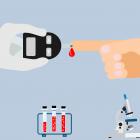If blood sugar rises after a meal, diabetic patients need to find the cause first in their diet. The following 6 eating habits will cause blood sugar to rise after meals. I hope you will not have them.
1. Irregular diet
Many diabetic patients do not eat quantitatively and eat as much as they want, often overeating accidentally. Healthy people often eat too much, which will increase the burden on pancreatic beta cells, which can easily lead to diabetes over time.
Diabetic patients often eat too much and their blood sugar cannot be controlled well after meals.
Correct approach: Eat a rationed meal. Put down your chopsticks or leave the table when you are seven to eighty percent full.
Seventy-eight percent full means: the stomach does not feel full, but the enthusiasm for food has decreased, and the speed of active eating has also slowed down significantly. The most important thing is that you will not feel hungry before the next meal.
2. Eat a lot of whole grains
Because whole grains contain more dietary fiber, they will make you feel full after eating, make you less hungry, and can delay the absorption of sugar. Therefore, it is recommended that diabetic patients eat more whole grains.
However, some people with diabetes think that eating whole grains is good, so they just eat a lot of whole grains. Some people with diabetes can eat two whole grain steamed buns in one meal. If you eat like this, will your blood sugar level improve after a meal?
Correct approach: Whole grains are also a staple food. You don’t have to eat them every day, but you also need to limit them. Under normal circumstances, each meal should not exceed 2 taels of staple food, and you should eat five or six taels a day. If you are obese, limit your daily staple food to between four and five taels. The weight of staple food here refers to raw weight.
3. My blood sugar is not well controlled and I still eat fruit.
Most fruits contain glucose and fructose, which may have a certain impact on blood sugar levels for diabetic patients. If your blood sugar has always been very high, eating fruit is like adding insult to injury, and your blood sugar will definitely not be well controlled.
Correct approach: Use tomatoes and cucumbers instead of fruits when blood sugar is high. When fasting blood sugar is less than 7.0mmol/L, blood sugar 2 hours after a meal is less than 10.0mmol/L, and is stable for a week, then eat fruit.
4. Eat starchy foods as vegetables
Some starch-rich vegetables, such as potatoes, taro, yams, pumpkins, lotus roots, etc., are mainly composed of carbohydrates, which are similar to staple foods.
For example, many diabetic patients like to eat jealous potato shreds. They may eat this dish together with staple food in one meal. This combination of staple food and staple food will lead to excessive carbohydrate intake and a certain increase in blood sugar after the meal.
Correct approach: When eating potatoes, taro, yams, pumpkins, lotus roots and other vegetables, be sure to control the amount of food consumed and reduce the amount of staple food.
5. Eating too many melon seeds and other nuts
Many diabetic patients have the habit of eating melon seeds and eat a few handfuls of them without realizing it. You must know that more than 30 melon seeds are equivalent to 1 tablespoon of oil. The energy of oil is higher than that of meat. Generally, 50 grams of lean meat can produce 90 kilocalories of energy, and a spoonful of oil can produce 90 kilocalories of energy. It is easy to exceed the energy limit by eating this way. Will the blood sugar be good?
Correct approach: Eat melon seeds in a limited amount, as well as other nuts. A small handful a day is enough.
6. Eat more nutritious food
Many people think that milk has high nutritional value, so they drink milk as water; some people think that the protein of fish and shrimp has high nutritional value, so they eat a lot of fish and shrimp.
As everyone knows, the protein our body needs is limited. People with normal kidney function need 1 gram of protein per kilogram of body weight per day. Eating too much will only increase the burden on the kidneys, exceed the energy limit, and cause blood sugar to rise.
Correct approach: half a pound of milk per day is enough. You must also control the amount of fish and shrimp you eat, and do not eat large amounts of any food.

